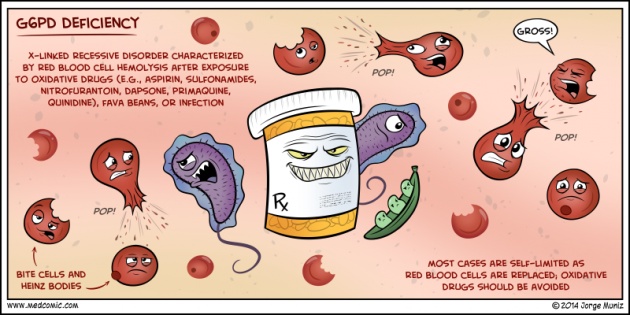Sometimes learning can save someone else's life"
We have history of diabetes and heart ailments, both hereditary. Then another is being added on the list, three of the young ones of the family has them, a deficiency that is connected to blood, the G6PD Deficiency or Glucose-6-Phosphate dehydrogenase Deficiency, and I thank the new-born baby screening for seeing that.
The deficiency is new to me, too new that I have to check what is it and its effects.
What is G6PD Deficiency?

*Image is credited to deyingyu.blogspot.com
Glucose-6-Phosphate Dehydrogenase Deficiency (G6PD) is a genetic abnormality that results with the inadequate amount of glucose-6-phosphate dehydrogenase in the blood. Glucose-6 Phosphate Dehydrogenase plays an important role in our blood. This enzyme regulates various biochemicals into the body. It is also responsible in keeping the red blood cells healthy, so that they can function very well and live its normal life span.
When the enzyme(G6PD) is not there, a premature break down of our red blood cells happens and its destruction can lead to hemolysis or hemolytic anemia.
There is no specific treatment yet, so avoiding what will triggers it is the best option for now.
An ounce of prevention is worth than a pound of cure"--Benjamin Franklin
Foods to avoid.
My nephew is the first of the family to have G6PD Deficiency, then two of my nieces follows. Knowing what food to avoid has been the best thing my family can do for now, but then there were times that my nephew can not hold of himself and eat the food he was told not to eat, out of curiousity and the effect had made him sick for days, and he learned his lesson.
Here are some of the food that should be avoided.
- Fava Beans or other legumes. Monggo beans, and peanuts are a no no for the young ones.
- Menthol. Candies that has it is banned at home. The young ones can have another toothpaste since we are using toothpaste that has it.
- Sulfite. Some food and wine has it. It is used as preservative, it can be on dried fruits, preserved radish or dried potato products.
- Artificial blue food coloring. Take note of artificial, natural ones are said to be fine.
- Ascorbic acid. This can be in our food or the vitamins that we are taking. Better check the label on what to give to those who has G6PD.
- Bitter Gourd and Garden egg. Me and my family loves bitter gourd, and knowing its effect with diabetes, we surely does. But we have to be careful with feeding the young ones, I am glad that bitter gourd is not that kid-friendly yet to them.
- Aspirin. The reason why my nephew can not just take pain relievers.
But in case of acute phase of hemolysis, blood transfusions might be necessesary, or even dialysis in case of acute kidney failure.

*Image credited to youtube.
Signs and Symptoms
Knowing the signs and symptoms is best to know too. Since there is no cure yet, that knowing what is not allowed for someone who has it is the only way you can know how is it affecting a person with G6PD. But most individuals with G6PD are asymptomatic, or symptoms are not visible.
- Sudden rise of body temperature and yellow coloring of mucous membrane.
- Dark yellow-orange urine
- Pallor, fatigue, general deterioration of physical conditions.
- Heavy fast breathing.
- Weak, rapid pulse.
Facts about G6PD
1. There is estimated 400 million people worldwide have glucose-6 phosphate dehydrogenase deficiency. The condition mostly affects most frequently in some parts of Africa, Asia and Mediterranean. The ratio is 1:10 African-American males in United States.
2. The discovery of G6PD Deficiency relied heavily upon the testing of prisoner voluteers at Illinois State Penitentiary, but the study is still considered unethical until now.
3. A G6PD deficient individuals do not appear to get any illnesses more frequently than other people.
4. There are two variants of G6PD that are said to be common, they are G6PD A and G6PD Mediterranean.
5. A G6PD deficient is said to be partially or fully protected against malaria.
It is not just enough to know what is the deficiency of my loved ones, I have to look deeper into it. I am not in the medical field, but it is not an excuse for me to check everything and you don't have to be on that field to have a reason to take care of your loved ones. To have a better understanding with the deficency.
Aside from knowing, I have to spread awareness to those who have no idea about the glucose-6 phosphate dehydrogenase deficiency, better to be aware and properly informed than be sorry.
Here is a video that will help you in knowing more about G6PD.
*Video is credited to Youtube via Claudia Tan
Note:Consult or ask your doctor for more information regarding G6PD, asking the right person is still much better than relying on what you read.
References:



